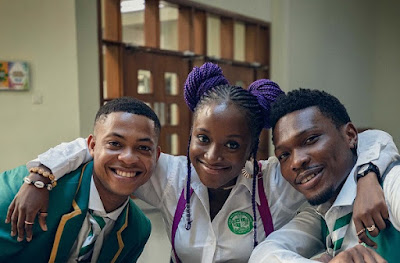The various renditions of The Addams Family have the reputation of being gay-friendly, but I don't recall a single actual LGBT character, or even any significant gay subtexts: it's heterosexual romance all the way down. I'm hoping that the new Netflix tv series Wednesday, which places the teenage Wednesday Addams in the Nevermore Academy, a boarding school for vampires, werewolves, and other magical types, will move into uncharted territory with actual gay characters. I watched the episode with a school dance, to check for same-sex couples dancing, foreground or background. .
Scene 1: Wednesday and Thing (her disembodied hand companion) break into the coroner's lab to perform an autopsy on a victim of a monster attack. About what you would expect: some defensive wounds, almost completely disemboweled. Whoops, they have to hide as the coroner enters, with the sheriff, to show him that the two toes were removed from the victim's left foot. By the way, this is Dr. Anwar's last week: he and the Mrs. are going to spend his retirement traveling. He's doomed. Nope, I looked it up: he only appears in this one episode. So the retirement and the "Mrs." reference are irrelevant, except to identify him as heterosexual.
Scene 2: Wednesday's dorm room at the Nevermore Academy. Her roommate objects to the forensic photos covering the wall. She notes that the victims all had different body parts surgically removed: a kidney, a gall bladder, a finger. This is not a monster; it's an experienced serial killer!
Scene 3: Botany class. Wednesday sits next to Xavier (Percy Hynes White, left), her gay bff or boyfriend. He encourages her to invite someone to the big dance, the Rav'n (because it's the Nevermore Academy, get it?) "I'd rather stick needles in my eyes. I may do that anyway."
She notices scratch marks on his neck. He explains that he got them from...um...fencing.
Scene 4: To find out what's going on with Xavier, Wednesday and Thing sneak into his art studio, and find paintings of a sharp-clawed monster. He must be the murderer! They steal a few -- oh no, he caught them. The girl has no luck with secret missions! Fortunately, he assumes that Wednesday came to invite him to the dance, but now she has to go through with it. Oh, well, she can interrogate him about the murders.
Scene 5: The Roommate is thrilled that Wednesday is exhibiting heterosexual interest (was there a question?), and starts planning an outfit for her. While she is shopping, Wednesday runs into her therapist, who asks if she is going to the dance (the heteronormative imperative never stops, does it?) Then she takes the monster drawings to Galpin, the police detective who does the standard "let the professionals take care of it" routine.
Scene 6: Roommate and two other girls at a diner. Lucas Walker (Iman Marson), the mayor's son, drops by to ask her to the dance.
Meanwhile, Wednesday runs into the Detective's son, Tyler (Hunter Doohan, top photo), whom she has an intense-stare crush on. He was planning to ask her to the dance, but she's already going with Xavier, which upsets him. "You keep giving me mixed signals. I thought we liked each other, but then you pull something like this."
Scene 7: In a beekeepers' cabin, Wednesday is showing her evidence to Eugene (Moosa Mustafa), a Spanish-speaking boy who has a crush on her roommate. Ok, everybody is heterosexual so far. Eugene mentions his two moms, but a single sentence referring to non-appearing characters is insufficient. Maybe there will be some same-sex couples at the dance.
Scene 8: They investigate a mysterious cave and find manacles. They make plans to skip the dance and stake out the cave tonight.
Scene 9: The DJ at the dance, who has a crush on Wednesday, knocks on her door: Thing has pushed them together by dropping an invitation in his tip jar. This may be a new character, or it may be Tyler from Scene 6. There are so many guys with crushes on Wednesday that I can keep track. Is she like, madeo of video games?
Thing has also provided an appropriately macabre outfit, so Wednesday quickly changes. They are just leaving when Eugene (the beekeeping boy) shows up, livid over being dumped for the cave stake out. Xavier (the monster-drawing boy) is also livid.
Scene 10: The dance. Roommate arrives with Lucas, the Mayor's Son. She accidentally spills punch on his crotch, then kneels to clean it up, so her crush Ajax (Georgie Farmer) sees him and thinks she is giving him a blow job.
Still 13 minutes to go, but why continue? There are no LGBTQ people here. Not one. Not even a glimmer of subtext.
So much for the inclusivity of The Addams Family.
Update: One of the boys has two mothers, and when Uncle Fester visits, he says that Tyler has "clocked" him, but Wednesday immediately says "Tyler is not intersted in you." Fester is on the run from the law, so maybe he means "noticed that I'm a fugitive," but Wednesday's comment suggests that romantic interest (he's 18, so ok for an adult to date).
And that's it. Miniscule representation. Heterosexuals all the way down.












.jpg)

.jpg)
.jpg)


































